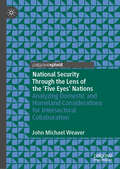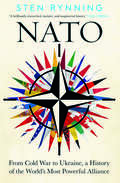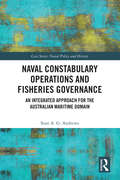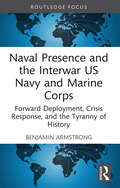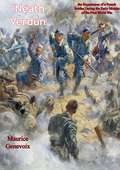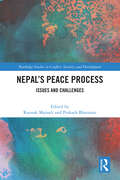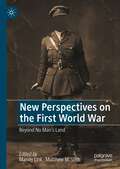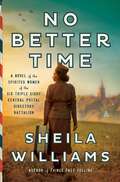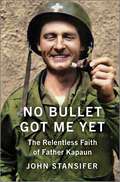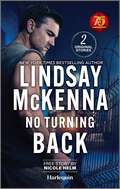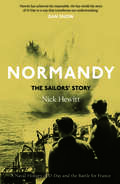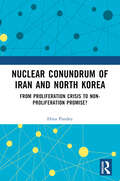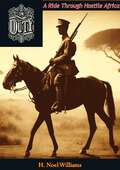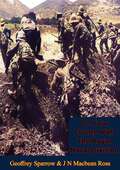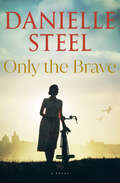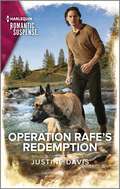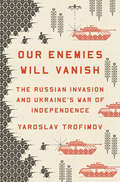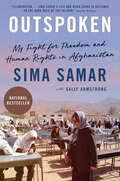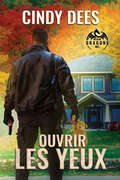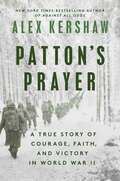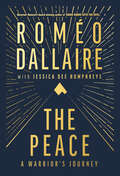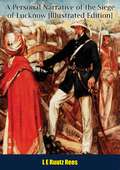- Table View
- List View
National Security Through the Lens of the ‘Five Eyes’ Nations: Analyzing Domestic and Homeland Considerations for Intersectoral Collaboration
by John Michael WeaverThis book analyzes the ‘Five Eyes’ nations’ concerns and policies relating to national security threats through an interdisciplinary theoretical engagement with the Political, Information, Security and Economic (PISE) Model. Through the analysis of secondary data sources such as scholarly and government reports, policy documents, press releases and interviews, the author analyzes the five case studies—Australia, Canada, New Zealand, UK, and the USA—to determine how and why nations use the PISE variables to shape favorable homeland security outcomes, to determine what the points of homeland intersectoral collaboration are among the ‘Five Eyes’ nations. In so doing, Weaver determines that although the ‘Five Eyes’ countries have concerns about homeland security and each, individually, identifies threats and hazards, they do also employ collaborative measures to build resilience and increase efforts to prepare for anticipated security breaches.
NATO: From Cold War to Ukraine, a History of the World's Most Powerful Alliance
by Sten RynningA wide-ranging new history of NATO, from its origins to the present day—published for the alliance&’s seventy-fifth anniversary For seven decades, NATO&’s stated aim has been the achievement of world peace—but playing great power politics always involves conflict. Russia&’s war on Ukraine and on Europe&’s security order puts the alliance under threat, but also demonstrates why transatlantic cooperation is so necessary. But how did NATO get to where it is today, and what does its future hold? In this incisive new account, Sten Rynning traces the full history of the North Atlantic Treaty Organisation from its origins to the present. Across its seventy-five years, NATO has navigated the twists and turns of Cold War diplomacy and nuclear deterrence, and has grown its membership. The alliance has become a guarantor of peace, but Rynning explores how its complex inner workings alongside Russian and Chinese opposition are now shaping its direction. At a time of strategic competition and geopolitical upheaval, Rynning offers us a clear-sighted account of the alliance&’s intriguing history—and asks what its ambitions might be for the future.
Naval Constabulary Operations and Fisheries Governance: An Integrated Approach for the Australian Maritime Domain (ISSN)
by Sean A. AndrewsThis book offers an analysis of naval constabulary operations, in particular Australian fisheries patrols, and challenges the widely accepted Anglo-American school of maritime thought.In the Indo-Pacific, fisheries and the activities of fishing boats are of increasing strategic importance in Australia’s region – Australia’s Four Oceans. Issues of overfishing, population growth and climate change are placing growing pressure on fish as a resource, and in doing so are making fisheries more significant, and significant on a strategic as opposed to simply an economic or environmental level. When, combined with the growing use of fishing vessels as para-naval forces, it is clear that the activities of fishing vessels, whether fishing or not fishing, are matters of considerable strategic relevance. This book illuminates contemporary seapower challenges, explains and defines maritime security and examines and refines existing theory to advance a set of new or refined concepts to help frame the on-water activities of constabulary operations -- reducing the possibility of on-water miscalculation between states.This book will be of much interest to students and scholars of naval studies and sea power, maritime strategy, maritime security and International Relations.
Naval Presence and the Interwar US Navy and Marine Corps: Forward Deployment, Crisis Response, and the Tyranny of History (Corbett Centre for Maritime Policy Studies Series)
by Benjamin ArmstrongThis book examines the US Navy and Marine Corps during the interwar years from a new perspective. Rather than focusing on the technologies developed, the wargames conducted, or the results of the now famous Fleet Problems, this work analyzes the global deployments of the rest of the US fleet. By examining the annual reports of the Secretary of the Navy, the Chief of Naval Operations, and the Commandant of the Marine Corps over twenty years, the book traces the US ships, squadrons, and fleets conducting naval diplomacy and humanitarian missions, maritime security patrols, and deployments for deterrent effect across the world’s oceans. Despite the common label of the interwar years as “isolationist,” the deployments of the US Navy and Marine Corps in that period were anything but, the majority of the literature on the era has a narrow focus on preparation for combat and wartime, which provides an incomplete view of the history of US naval power and also establishes a misleading set of precedents and historical context for naval thinkers and strategists in the contemporary world. Offering a wider, and more complete understanding of the history of the U.S. Navy and Marine Corps from 1920 to 1939, this book demonstrates both the tension between the execution of peacetime missions and the preparation for the next war, while also offering a broader understanding of American naval forces and their role in American and global history. This book will be of much interest to students of naval and military history, seapower, and International History.
'Neath Verdun: the Experiences of a French Soldier During the Early Months of the First World War
by Maurice Genevoix“The war of the French volunteersThis book does not concern the Battle of Verdun in 1916—widely considered to be the largest battle in world history, rather it positions the action geographically for the reader. Written during wartime this account concerns the personal experiences of a young officer of the French infantry from the earliest days of the Great War through a period of comparative fluidity of movement before the stalemate of trench warfare. The fighting concerns the actions about the Meuse and the Marne in the first year of the war from a French perspective and concludes as the 'armies go to earth' in the early part of 1915. Genevoix takes the reader into the heart of his enthusiastic young group of comrades and soldiers on campaign to provide valuable insights into the opening phases of the great conflict the French infantry knew.”-Print ed.
Nepal’s Peace Process: Issues and Challenges (Routledge Studies in Conflict, Security and Development)
by Raunak Mainali Prakash BhattaraiThis volume provides a holistic overview of the long peace process in Nepal following the signing of the Comprehensive Peace Agreement (CPA) in 2006.The date of 21 November 2021 marked the 15th anniversary of the Comprehensive Peace Agreement (CPA) which concluded the decade-long civil war that had ravaged Nepal. Despite avoiding a resurgence of statewide conflict, Nepal’s post-conflict era has been far from perfect. This era has witnessed ethnic violence, rampant corruption, the politicisation of key public institutions and a failure to fully implement the provisions of the CPA. The resulting lack of socio-economic progress has led to large-scale dissatisfaction within the country and even given rise to elements within Nepal who reject the framework of the CPA and the 2015 constitution.With a focus on the years following the 2015 constitution, this book offers an analysis of post-conflict Nepal and explores issues relating to ex-combatants, transitional justice, women, socio-economic affairs, and federal governance. The contributors are all scholar-practitioners, some of whom had direct involvement in the peace process, and are therefore able to offer unique insights into the processes and challenges of Nepal’s long journey to addressing past grievances and promoting future peace in the country.This book will be of interest to students of peace studies, Asian politics, security studies and International Relations.
New Perspectives on the First World War: Beyond No Man’s Land
by Mandy Link Matthew M. StithTaken collectively, the chapters in New Perspectives on the First World War: Beyond No Man’s Land not only illuminate pieces of the Great War that remain in the shadow of the broader narratives, but also, and more importantly, foster new perspectives, pose distinct questions, and suggest fresh directions from which future work might emerge. Transnational approaches, the cultural and environmental history of war, and gender’s ubiquitous but heretofore marginalized role in the larger conflict together merit fresh research and careful new interpretation.
No Better Time: A Novel of the Spirited Women of the Six Triple Eight Central Postal Directory Battalion
by Sheila WilliamsThe acclaimed author of The Secret Women and Things Past Telling returns with an engrossing historical novel about a little known aspect of World War II—the 6888th Central Postal Directory Battalion, the only Black WACs to serve overseas during the conflict. In the wake of the attack on Pearl Harbor in December 1941, Dorothy Thom, Spelman graduate, librarian and Francophile, joins the Women’s Army Corps wanting to do her part for the war effort. Longing for adventure, she has one question for the recruiter: “Do you think I’ll get to go abroad?”As Dorothy and her sister WACs discover, life in the Army is an adventure filled with unexpected deprivations and culture shock. Women from all levels of society, secretaries, teachers, and sharecroppers, work together to navigate a military segregated by race and gender. At boot camp, the “colored girls” are separated for processing. At Ft. Riley, the women’s barracks are rustic and heated by coal-burning pot-bellied stoves while German POWs spend their incarceration in buildings with central heat and hot water.In early 1945, Dorothy and eight hundred African American WACs cross the turbulent North Atlantic to their post in England. Their orders are to process the mail sent to GIs from their loved ones back home, an estimated 17 million pieces. The women arrive to find mail stockpiled for over two years in warehouses and airplane hangars, many pieces in poor condition, the names illegible. In England and France, the WACs traverse a landscape of unimagined possibilities. With their outlooks changed forever, they return to the United States as the catalysts for change in America and build lives that transcend anything their ancestors ever dreamed of. No Better Time illuminates a love of country and duty that has been overlooked until now.
No Bullet Got Me Yet
by John StansiferThe incredible story of the most decorated chaplain in US military history and his path to sainthood in the Roman Catholic Church. Father Emil Kapaun, a humble priest, went far beyond the call of duty during World War II and the Korean War. Often found with the combat medics on the front lines, unarmed, ministering to the wounded, and known for his intense devotion to the soldiers whom he called &“my boys,&” Kapaun became the most decorated chaplain in US military history, awarded a Medal of Honor, the Distinguished Service Cross and the Legion of Merit. But Father Kapaun&’s leadership, bravery and selflessness don't end there. When the story of human history is over, evil, death, darkness—they don&’t get the final word. It was Father Kapaun&’s love for God that gave him the courage to lay down his life for his friends and for his country. Writer John Stansifer has spent years interviewing veterans and ex-POWs. Coupled with other interviews or self-published war experiences, as well as material from the National Archives and rare access to thousands of unseen documents, No Bullet Got Me Yet unveils the compelling history of the life of Father Kapaun as related by his friends, family and fellow soldiers, as well as in his own words from the numerous letters he wrote from the 1930s all the way to the battlefields of the Korean War.
No Turning Back: Thrilling Military Romance
by Lindsay McKenna Nicole HelmA military captain must balance duty and desire in this edge-of-your-seat suspense novel by New York Times bestselling author Lindsay McKenna.On the edge of war,a country needs its protectors.Captain Ram Kozak is steeled to defend his country against all those who would hurt it. His only weak point is Darina &“Dare&” Mazur, a US Army Special Forces combat medic. She has a confidence—and loving touch—that brings him to his knees. But with the fate of his team and his country at stake, is Dare&’s love a deadly distraction…or the only thing that can save him?FREE BONUS STORY INCLUDED IN THIS VOLUME!Cold Case Investigation by Nicole HelmAfter almost losing her life in a fire, Wyoming PI Anna Hudson wakes up to the sight of a familiar stranger. Anna and Hawk Steele shared one passionate night. Now the arson investigator will go to any lengths to protect Anna and their baby-to-be. But as they search through cold cases, exposing a tangled family history, a killer after revenge for past sins could steal Anna and Hawk&’s future…Don&’t miss the complete Harlequin 75th Anniversary Collection: Taming a Heartbreaker by Brenda Jackson No Turning Back by Lindsay McKenna Rancher&’s Law by Diana Palmer Save Me by Sharon Sala A Murderer Among Us by Heather Graham A Beach House Beginning by RaeAnne Thayne Renegade Wife by B.J. Daniels Tying the Knot by Brenda Novak
Normandy: A Naval History of D-Day and the Battle for France
by Nick HewittThe first account of the Allied navies&’ vital contribution to the success of the D-Day landings and the Normandy campaign The Allied liberation of Nazi-occupied Europe is one of the most widely recognised events of modern history. The assault phase, Operation Neptune, began with the D-Day landings in Normandy—one of the most complex amphibious operations in history, involving 7,000 ships and nearly 200,000 men. But despite this immense effort, the wider naval campaign has been broadly forgotten. Nick Hewitt draws on fascinating new material to describe the violent sea battle which mirrored the fighting on land, and the complex campaign at sea which enabled the Allied assault. Aboard ships ranging from frail plywood landing craft to sleek destroyers, sailors were active combatants in the operation of June 1944, and had worked tirelessly to secure the Seine Bay in the months preceding it. They fought battles against German submarines, aircraft, and warships, and maintained careful watch to keep control of the English Channel. Hewitt recounts these sailors&’ stories for the first time—and shows how, without their efforts, D-Day would have failed.
Nuclear Conundrum of Iran and North Korea: From Proliferation Crisis to Non-Proliferation Promise?
by Hina PandeyThis book examines Iran and North Korea from a non-proliferation lens. It highlights how these two countries stand out as nuclear challenges vis-à-vis the NPT and unpacks their nuclear history, recent developments, nuclear resolve in the times of the pandemic and future challenges in a comprehensive manner. It shows how these two issues remain similar, distinguished, dynamic but static so far progress on non-proliferation is concerned. The book will be a valuable read for students, scholars, academicians, policy practitioners and anyone invested and interested in nuclear issues. Print edition not for sale in South Asia (India, Sri Lanka, Nepal, Bangladesh, Pakistan and Bhutan)
On Duty: A Ride Through Hostile Africa
by Parker GillmoreEmbark on a daring adventure through the untamed landscapes of 19th-century Africa with Parker Gillmore's On Duty: A Ride Through Hostile Africa. This gripping narrative offers a vivid account of Gillmore's perilous journey across the continent, providing readers with an intimate glimpse into the challenges and dangers faced by explorers during this era.Parker Gillmore, an intrepid traveler and seasoned hunter, recounts his experiences as he navigates through regions marked by political unrest, diverse wildlife, and unpredictable terrain. On Duty captures the spirit of exploration and the relentless pursuit of discovery that characterized the age of imperial expansion.Gillmore's narrative is rich with detailed descriptions of the African landscape, from dense jungles and arid savannas to majestic rivers and towering mountains. His keen observations bring to life the beauty and brutality of the natural world, offering readers a sensory journey through some of the most remote areas of the continent.This book is an essential read for history enthusiasts, adventure seekers, and anyone interested in the exploration of Africa. Parker Gillmore's engaging storytelling and firsthand account provide a fascinating perspective on the trials and triumphs of life on the frontier.Join Parker Gillmore on his extraordinary ride through hostile Africa and experience the thrill of exploration and the enduring allure of the unknown. On Duty is a timeless chronicle of adventure, discovery, and the indomitable human spirit.
On Four Fronts with the Royal Naval Division
by Geoffrey Sparrow J N Macbean Ross“The Blue Jackets who fought on landThe time of Nelson was not only notable because of the success in nautical warfare of the man himself, but also because it was the zenith of the 'age of sail' that left British sea power so dominant that Britannia really did 'rule the waves.' No navy could stand against the might of the Royal Navy, and so until Jutland during the Great War it would not fight another major battle at sea. Queen Victoria's ever expanding empire meant that British forces were perpetually set against often underdeveloped powers and the navy took its part, but most of the hard work of empire building would inevitably fall upon the British army. Of course, the Royal Navy had its own 'soldiers'—the Royal Marines. The particular talents and skills of sailors were often required, particularly whilst manning 'the guns, ' so the 19th century saw the 'blue jackets' in action in the Crimean War, the Indian Mutiny, the Zulu War, the Boer War and several other conflicts. The early years of the 20th century brought a period of instability that inexorably dragged the great powers of Europe towards the cataclysm of blood which was to be the Great War of 1914-18...The Royal Naval Division was formed around a cadre of Royal Marines and sailors and was expanded as a unit of the New Army by volunteers. The Division saw action in the defence of Antwerp in 1914, on Helles and Anzac during the disastrous Gallipoli Campaign in 1915 and on the Western Front where it took part in the Battle of the Somme in 1916 and the Third Battle of Ypres in 1917. This book was written by one of the their number and is an often light-hearted account of the wartime record of the division, full of incident and anecdote and scattered with occasionally humorous line drawings. There is little in print about the Royal Naval Division in the First World War so this will make a welcome addition to any naval library.”-Print ed.
On The Old Plantation Reminiscences of his Childhood
by J. G. ClinkscalesA white Southerner's sympathetic memoir of plantation life. John George Clinkscales (1855-1942) was the 11th of 12 children of the owner of "Broadway," a 1,200 acre plantation in the Abbeville District of South Carolina, home to 110 slaves. Originally published in 1916 in Spartanburg, South Carolina.“John George Clinkscales was born in 1855 in Abbeville, South Carolina, and grew up on his father's plantation. He graduated from Wofford College in Spartanburg, South Carolina in 1876 and taught in county schools for several years before accepting a position at Williamston Female College in Anderson County, South Carolina in 1881. Clinkscales was elected superintendent of education in Anderson and served in that capacity for four years before returning to teaching. In 1914, Clinkscales campaigned for governor, running on a platform advocating compulsory education. Although he did not win, his strong showing led the legislature to pass the first compulsory education law in South Carolina. Clinkscales wrote two books: a novel, How Zach Came to College (1907), and his memoir, On the Old Plantation (1916). Both were widely read in the South.In his book, On the Old Plantation, Clinkscales records his memories of life on his father's plantation. He hoped that his book would serve as a counterargument to Harriet Beecher Stowe's negative depiction of slavery in Uncle Tom's Cabin. To that end, he began his memoir with a story of his father's foreman, "Unc' Essick" that portrays his father's benevolence towards his slaves. He also included stories about the character of particular slaves, written in dialect. Clinkscales recounts his childhood pranks, adventures, and school experiences, which combine to present his happy memories of antebellum South Carolina.”-Harris Henderson
Only the Brave
by Danielle SteelSophia Alexander, the beautiful daughter of a famous surgeon in Berlin, has had to grow up faster than most young women. When her mother falls ill, Sophia must take charge of her younger sister, Theresa, and look after her father and the household, while also volunteering at his hospital after school. Meanwhile, Hitler’s rise to power and the violence in her very own town have Sophia concerned, but only her mother is willing to share her fears openly. <P><P> After tragedy strikes and her mother dies, Sophia becomes increasingly involved in the resistance, attending meetings of dissidents and helping however she can. Circumstances become increasingly dangerous and personal when Sophia assists her sister’s daring escape from Germany, as Theresa flees with her young husband and his family. Her father also begins to resist the regime, secretly healing those hiding from persecution, only to have his hospital burned to the ground. When he is arrested and sent to a concentration camp, Sophia is truly on her own, but more determined than ever to help. <P><P> While working as a nurse with the convent nuns, the Sisters of Mercy, Sophia continues her harrowing efforts to transport Jewish children to safety and finds herself under surveillance. As the political tensions rise and the brutal oppression continues, Sophia is undeterred, risking it all, even her own freedom, as she rises to the challenge of helping those in need—no matter the cost. <P><P> In Only the Brave, Danielle Steel vividly captures the devastating effects of war alongside beautiful moments of compassion and courage. <p> <b>New York Times Bestseller</b>
Operation Rafe's Redemption (Cutter's Code #17)
by Justine DavisTo bring down a traitor…She needs the man who betrayed her love!Years ago, Foxworth Foundation operatives walked into a trap that almost annihilated them all. So when Charlie Foxworth—the firm&’s cool financial mastermind—finds the man responsible, she&’ll stop at nothing to take him down. But to do it, she needs unflappable former sniper Rafe Crawford—the man who shattered her heart—plus K-9 Cutter. Little does she know, they also might be key to keeping her alive! From Harlequin Romantic Suspense: Danger. Passion. Drama.Read the Cutter's Code series from the beginning! Book 1: Operation Midnight Book 2: Operation Reunion Book 3: Operation Blind Date Book 4: Operation Unleashed Book 5: Operation Power Play Book 6: Operation Homecoming Book 7: Operation Soldier Next Door Book 8: Operation Alpha Book 9: Operation Notorious Book 10: Operation Hero's Watch Book 11: Operation Second Chance Book 12: Operation Mountain Recovery Book 13: Operation Whistleblower Book 14: Operation Payback Book 15: Operation Witness Protection Book 16: Operation Takedown Book 17: Operation Rafe's Redemption
Our Enemies Will Vanish: The Russian Invasion and Ukraine's War of Independence
by Yaroslav Trofimov&“Our Enemies Will Vanish achieves the highest level of war reporting: a tough, detailed account that nevertheless reads like a great novel. One is reminded of Michael Herr's Dispatches . . . Frankly, it's what we have all aspired to. I did not really understand Ukraine until I read Trofimov's account.&” —Sebastian JungerA revelatory eyewitness account of Russia&’s invasion of Ukraine and heroism of the Ukrainian people in their resistance by Yaroslav Trofimov, the Ukrainian chief foreign-affairs correspondent for The Wall Street Journal.Since Russia invaded Ukraine in February 2022, Yaroslav Trofimov has spent months on end at the heart of the conflict, very often on its front lines. In this authoritative account, he traces the war&’s decisive moments—from the battle for Kyiv to more recently the gruelling and bloody arm wrestle involving the Wagner group over Bakhmut—to show how Ukraine and its allies have turned the tide against Russia, one of the world&’s great military powers, in a modern-day battle of David and Goliath. Putin had intended to conquer and annex Ukraine with a vicious blitzkrieg, redrawing the map of Europe in a few short weeks with seismic geopolitical consequences. But in the face of this existential threat, the Ukrainian people fought back, turning what looked like certain defeat into a great moral victory, even as the territorial battle continues to seesaw to this day. This is the story of the epic bravery of the Ukrainian people—people Trofimov knows very well.For Trofimov, this war is deeply personal. He grew up in Kyiv and his family has lived there for generations. With deep empathy and local understanding, Trofimov tells the story of how everyday Ukrainian citizens—doctors, computer programmers, businesspeople, and schoolteachers—risked their lives and lost loved ones. He blends their brave and tragic stories with expert military analysis, providing unique insight into the thinking of Ukrainian leadership and mapping out the decisive stages of what has become a perilous war for Ukraine, the Putin regime, and indeed, the world.This brutal, catastrophic struggle is unfolding on another continent, but the United States and its NATO allies have become deeply implicated. As the war drags on, it threatens to engulf the world. We cannot look away. At once heart-breaking and inspiring, Our Enemies Will Vanish is a riveting, vivid, and first-hand account of the Ukrainian refusal to surrender. It is the story of ordinary people fighting not just for their homes and their families but for justice and democracy itself.
Outspoken: My Fight for Freedom and Human Rights in Afghanistan
by Sima SamarThe impassioned memoir of Afghanistan's Sima Samar: medical doctor, public official, founder of schools and hospitals, thorn in the side of the Taliban, nominee for the Nobel Peace Prize, and lifelong advocate for girls and women.&“I have three strikes against me. I&’m a woman, I speak out for women, and I&’m Hazara, the most persecuted ethnic group in Afghanistan.&”Dr. Sima Samar has been fighting for equality and justice for most of her life. Born into a polygamous family, she learned early that girls had inferior status, and she had to agree to an arranged marriage if she wanted to go to university. By the time she was in medical school, she had a son, Ali, and had become a revolutionary. After her husband was disappeared by the pro-Russian regime, she escaped. With her son and medical degree, she took off into the rural areas—by horseback, by donkey, even on foot—to treat people who had never had medical help before.Sima Samar's wide-ranging experiences both in her home country and on the world stage have given her inside access to the dishonesty, the collusion, the corruption, the self-serving leaders, and the hijacking of religion. And as a former Vice President, she knows all the players in this chess game called Afghanistan. With stories that are at times poignant, at times terrifying, inspiring as well as disheartening, Sima provides an unparalleled view of Afghanistan&’s past and its present. Despite being in grave personal danger for many years, she has worked tirelessly for the dream she is convinced is an achievable one: justice and full human rights for all the citizens of her country.
Ouvrir les yeux (Black Dragons, Inc (Français))
by Cindy DeesJadis meilleurs amis, Gunner et Chas ne se sont pas revus depuis une décennie, mais ils mettent leurs différends de côté pour sauver une petite fille de dix-huit mois – et peut-être aussi eux-mêmes. Suite à un malencontreux accident, Gunner Vance se voit contraint de renoncer à sa carrière de Navy SEAL. Il est amer et en colère. C&’est alors que son ami d&’enfance et amant d&’un soir réclame son aide. Chasten Reed est enseignant, sa petite vie calme et solitaire se retrouve totalement bouleversée quand il découvre devant sa porte un cadavre et une petite fille. Pourchassé par des tueurs armés, Chas comprend vite qu&’un commando serait sa meilleure chance de rester en vie. La mission de Chas et de Gunner est simple : identifier l&’enfant et la ramener saine et sauve à sa famille. Mais « simple » n&’est pas synonyme de « facile » et le danger les guette à chaque étape de leur long périple à travers le pays, de la Nouvelle-Angleterre jusqu&’à Hawaï. La forte attraction sexuelle qui existe entre eux ne les protégera pas des balles. Les deux amants sauront-ils profiter de cette seconde chance que leur offre le destin ? Réussiront-ils à assouvir leur passion ou laisseront-ils leurs divergences d&’opinions les séparer ?
A Particular Man
by Lesley GlaisterLove never dies in this novel by &“a writer of addictive emotional thrillers&” (The Independent). Told from three perspectives A Particular Man is about love, truth and the unpredictable consequences of loss. When Edgar dies in a Far East prisoner of war camp it breaks the heart of fellow prisoner Starling. In Edgar&’s final moments, Starling makes him a promise. When, after the war, he visits Edgar&’s family to fulfill this promise, Edgar's mother Clementine mistakes him for another man. Her mistake allows him access to Edgar&’s home and to those who loved him, stirring powerful and disorientating emotions, and embroiling him in a web of deceit. The loss has driven his sister Aida to seek solace in the arms of a series of men—but the meeting with Starling sparks a complex connection, fueled by their mutual longing for Edgar. Meanwhile Clementine, also grieving for Edgar, has secrets of her own… &“One of Britain&’s finest novelists.&” —The Sunday Telegraph &“[Glaister] commands respect for writing novels which are not just dark and mysterious but also emotionally satisfying.&” —The Times Literary Supplement &“An expert plotter.&” —The Scotsman
Patton's Prayer: A True Story of Courage, Faith, and Victory in World War II
by Alex KershawFrom Alex Kershaw, author of the New York Times bestseller Against All Odds, comes an epic story of courage, resilience, and faith during the Second World War General George Patton needed a miracle. In December 1944, the Allies found themselves stuck. Rain had plagued the troops daily since September, turning roads into rivers of muck, slowing trucks and tanks to a crawl. A thick ceiling of clouds had grounded American warplanes, allowing the Germans to reinforce. The sprint to Berlin had become a muddy, bloody stalemate, costing thousands of American lives. Patton seethed, desperate for some change, any change, in the weather. A devout Christian, he telephoned his head chaplain. &“Do you have a good prayer for the weather?&” he asked. The resulting prayer was soon printed and distributed to the 250,000 men under Patton&’s command. &“Pray when driving,&” the men were told. &“Pray when fighting. Pray alone. Pray with others. Pray by night and pray by day. Pray for the cessation of immoderate rains, for good weather for Battle. . . . Pray for victory. . . . Pray for Peace.&” Then came the Battle of the Bulge. Amid frigid temperatures and heavy snow, 200,000 German troops overwhelmed the meager American lines in Belgium&’s Ardennes Forest, massacring thousands of soldiers as the attack converged on a vital crossroads town called Bastogne. There, the 101st Airborne was dug in, but the enemy were lurking, hidden in the thick blanket of fog that seemed to never dissipate. A hundred miles of frozen roads to the south, Patton needed an answer to his prayer, fast, before it was too late.
The Peace: A Warrior's Journey
by Romeo DallaireInternational humanitarian icon and bestselling author General Roméo Dallaire guides readers on a crucial and inspiring journey from past wars through post-modern conflict toward a vision of lasting peace.In The Peace, Roméo Dallaire shows us the past, present and future of war through the prism of his own life. Trained in classic warfare during the Cold War era of mutual deterrence, Dallaire in good faith commanded the UN&’s peacekeeping mission for Rwanda in 1994, only to see the country abandoned and descend into the hell of genocide. The battered, tortured warrior who emerged from that catastrophe grew determined to help repair the new world disorder—to prevent genocide, abolish the use of child soldiers, and find ways to intervene in, even prevent, conflicts in defence of humanity. And so Dallaire helped advance the doctrines of Responsibility to Protect and the Will to Intervene only to witness those initiatives falter because of the same old power politics, national self-interest and general indifference that had allowed the genocide in Rwanda to unfold unchecked. In his final act, Dallaire has become a warrior working towards a better future in which those old paradigms are rejected and replaced. In The Peace he calls out the elements that undermine true security because they reinforce the dangerous, self-interested belief that &“balance&” of power and truces are the best we can do. Too often we say we are &“at peace&” because the bombs are falling elsewhere and we, ourselves, are not under attack. Dallaire shows us a path, instead, to what he calls &“the peace,&” a state where, above all else, humanity values the ties that bind us and the planet together—and acts accordingly. This book is the cri de coeur of a warrior who has been to hell and back and hopes to help guide us to a better place.
A Personal Narrative of the Siege of Lucknow [Illustrated Edition]
by L E Ruutz Rees[Illustrated with over one hundred maps, photos and portraits, of the battles, individuals and places involved in the Indian Mutiny]Fascinating account of Calcutta businessman and merchant L.E. Ruutz Rees of the tumultuous events of the Sepoy Revolt that threatened to overturn British power in India. At time of the rebellion he was travelling toward Oudh, which was to be a hotbed of violence in the coming months, and arrived at Lucknow. Initially confident that a complete uprising was not likely, Rees joined the irregular cavalry under General Lawrence when it was clear that significant fighting was imminent. He recounts the ill-conceived and badly managed attempt by Lawrence to breakout of Lucknow and following the botched battle of Chinnut he was forced back to Lucknow and the bitter fighting of the siege. Rees recounts the difficulties, heroics, brutalities and hard fighting of the siege within the 33 acre Residency site that lasted 88 days until the first relief. The final deliverance only arrived many days and much hardship later with the appearance of Sir Colin Campbell’s force as the second relief of Lucknow.
Personal Remembrances of Sir Frederick Pollock, Second Baronet, sometime Queen's Remembrancer Vol. I (Personal Remembrances of Sir Frederick Pollock #1)
by Sir Frederick Pollock"Personal Remembrances of Sir Frederick Pollock" offers an intimate glimpse into the life and times of one of the most distinguished legal scholars and historians of the 19th century. Sir Frederick Pollock, a prominent figure in English law, shares his personal recollections and experiences in this engaging memoir, providing readers with a rich tapestry of his professional achievements and personal anecdotes.The book chronicles Pollock's illustrious career as a barrister, judge, and legal writer, shedding light on his contributions to the development of common law and his influential role in legal education. Pollock's reminiscences are filled with vivid descriptions of his interactions with notable contemporaries, offering unique insights into the intellectual and social circles of Victorian England.Beyond his professional accomplishments, Pollock's memoir delves into his personal life, revealing the man behind the esteemed jurist. He reflects on his friendships, family, and the events that shaped his worldview. His narrative is characterized by wit, wisdom, and a deep appreciation for the nuances of human nature and society."Personal Remembrances of Sir Frederick Pollock" is more than just an autobiography; it is a historical document that captures the spirit of an era. Through Pollock's eloquent prose, readers are transported to a time of profound legal and social transformation. This book is an invaluable resource for historians, legal scholars, and anyone interested in the life of a remarkable figure whose legacy continues to influence the field of law.With its blend of personal reflection and historical context, "Personal Remembrances of Sir Frederick Pollock" provides a compelling portrait of a man who left an indelible mark on the legal landscape and offers timeless wisdom that resonates to this day.
